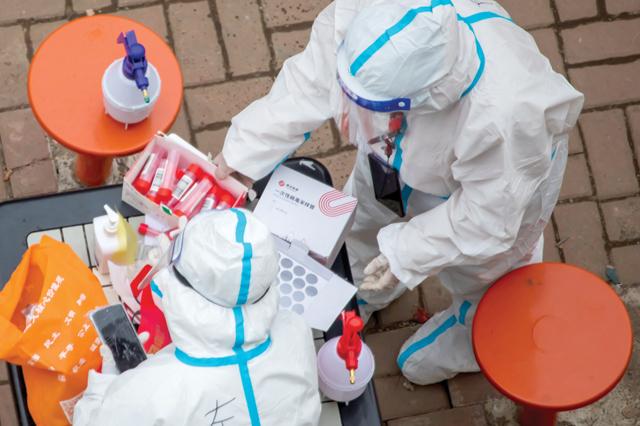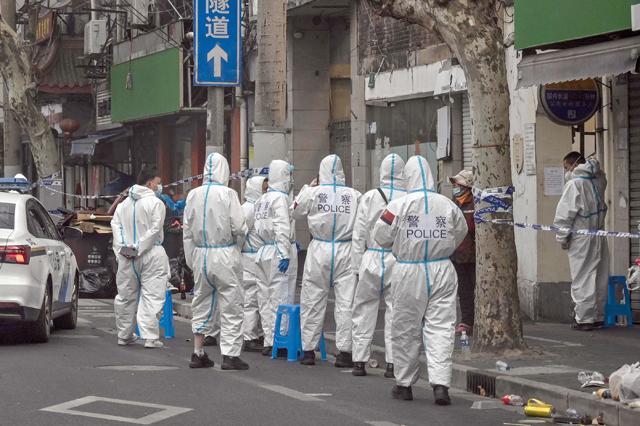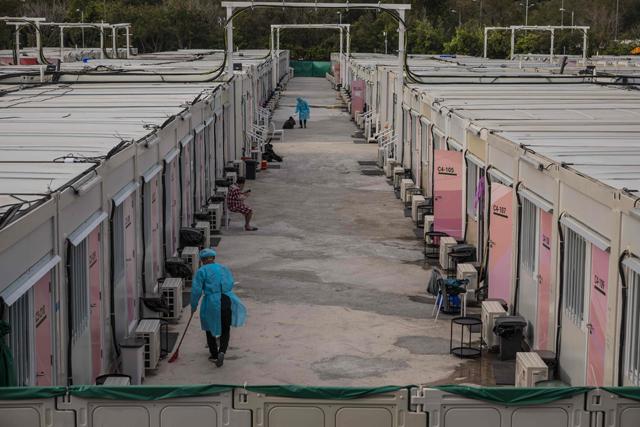You are here
Millions locked down as China wrestles worst virus outbreak in two years
By AFP - Mar 13,2022 - Last updated at Mar 13,2022

Medical workers prepare to conduct nucleic acid tests for the Covid-19 coronavirus for residents in Jilin on Saturday (AFP photo)
BEIJING — Millions of people across China endured lockdowns on Sunday as virus cases doubled to nearly 3,400 and anxiety mounted over the resilience of the country's "zero-COVID" approach in the face of the worst outbreak in two years.
A nationwide surge in cases has seen authorities close schools in Shanghai, lock down central neighbourhoods in the southern tech powerhouse of Shenzhen as well as whole northeastern cities, as almost 18 provinces battle clusters of the Omicron and Delta variants.
The city of Jilin, centre of the outbreak in the northeast, was partially locked down on Saturday, while residents of Yanji, an urban area of nearly 700,000 bordering North Korea, were confined to their homes Sunday.
China, where the virus was first detected in late 2019, has maintained a strict "zero-COVID" policy enforced by swift lockdowns, travel restrictions and mass testing when clusters have emerged.
But the latest flare-up, driven by the highly transmissible Omicron variant and a spike in asymptomatic cases, is testing the efficacy of that approach.
Zhang Yan, a Jilin health commission official, conceded that the response from local authorities had been lacking.
"The emergency response mechanism in some areas is not robust enough," he said at a press briefing on Sunday.
"There is insufficient understanding of the characteristics of the Omicron variant... and judgement has been inaccurate."
Residents of Jilin have completed six rounds of mass testing, with the city reporting more than 2,200 cases of the Omicron variant since Saturday.
The neighbouring city of Changchun, an industrial base of 9 million people — was locked down Friday, while at least three other small cities have been locked down since March 1.
The mayor of Jilin and the head of the Changchun health commission were dismissed from their jobs Saturday, state media reported, in a sign of the political imperative placed on local authorities to contain virus clusters.
But the strain is showing, with officials increasingly urging softer and more targeted measures to contain the virus, while economists warn tough clampdowns are hurting the economy.
In Shenzhen, the southern city of around 13 million bordering Hong Kong, residents have been caught between nerves over a renewed outbreak and angst at the swift, draconian measures to squash clusters.
“It’s the worst since 2020,” a Shenzhen resident surnamed Zhang told AFP. “The closures are too sudden, my friend woke up in the morning to find her building was sealed overnight without warning. Her boss had to mail her laptop to her.”
The Shenzhen subdistrict of Futian which was locked down Sunday is home to 300,000 people and a thriving commercial district. It shares a land border crossing with Hong Kong, where the caseload over recent weeks has soared, alarming officials in Beijing.
Hong Kong currently has one of the world’s highest death rates from the virus, as the Omicron variant cuts through its elderly population among whom vaccine hesitancy proliferates.
In China’s biggest city Shanghai, authorities have temporarily locked down individual schools, businesses, restaurants and malls over close-contact fears rather than using mass quarantines.
Authorities advised residents not to leave the city unless necessary and tourist attractions started requiring visitors to provide negative COVID tests.
“I have friends who I hung out with a few days ago but were suddenly quarantined recently,” Shanghai resident Serena Li told AFP.
The government’s approach will “protect citizens”, she said, adding: “In the long run, it’s good.”
Long lines were seen outside hospitals Sunday as people rushed to get tested.
“There’s no other way. We definitely have to do what the government has arranged,” said a data analytics worker surnamed Zhang.
As cases rise, the country’s National Health Commission announced on Friday that it would make rapid antigen tests available for citizens to buy online or from clinics for “self-testing”.
Last week, a top Chinese scientist said the country should aim to co-exist with COVID, like other nations, where Omicron has spread like wildfire.
Related Articles
BEIJING — All 17 million people in the Chinese tech hub of Shenzhen spent their first full day under lockdown on Monday, as restrictions spr
BEIJING — China moved to free up hospital beds as officials on Wednesday reported thousands of new cases from an Omicron-led coronavirus out
SHANGHAI — A Chinese city of 9 million was ordered into lockdown on Friday and Shanghai shut its schools as authorities scrambled to halt a














